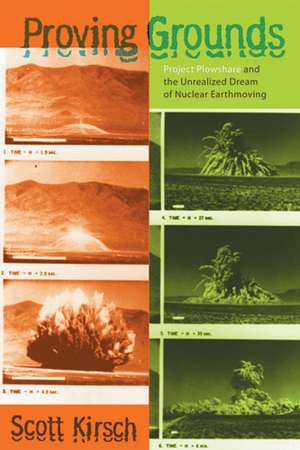Proving Grounds: Project Plowshare and the Unrealized Dream of Nuclear Earthmoving
Autor Scott L. Kirschen Limba Engleză Hardback – 6 oct 2005
Although unthinkable by today’s standards, the U.S. Atomic Energy Commission spent hundreds of millions of dollars between 1957 and 1974 studying the feasibility of using nuclear explosions for so-called “peaceful” purposes under a program called Project Plowshare. Nuclear earthmoving, promoted by the famed physicist, defense strategist, and anticommunist Edward Teller, was the most notorious of Plowshare’s experimental programs. Teller and his colleagues proposed using nuclear explosions to build canals, dig harbors, and create dams and quarries. Such “constructive” uses of atomic weaponry, they believed, would help defuse Americans’ fears about radioactive fallout and nuclear testing and would encourage continued support for nuclear research programs.
In Proving Grounds, Scott Kirsch traces the rise and fall of this astonishing cold war initiative. He examines the work that went into making “geographical engineering” or “earthmoving” an imminent possibility as well as the public controversy, scientific uncertainty, and political opposition that kept it—with the exception of several massive craters in the Nevada desert—out of the landscape.
On one level, Kirsch demonstrates how the history of Project Plowshare was shaped by the specific issues and sentiments that influenced American nuclear and environmental policy during the 1950s and 1960s. But Kirsch also argues that the lessons learned from this case continue to hold relevance today. By exploring key issues of science and risk, Proving Grounds warns that knowledge production and environmental politics are still very much intimately, and dangerously, related.
In Proving Grounds, Scott Kirsch traces the rise and fall of this astonishing cold war initiative. He examines the work that went into making “geographical engineering” or “earthmoving” an imminent possibility as well as the public controversy, scientific uncertainty, and political opposition that kept it—with the exception of several massive craters in the Nevada desert—out of the landscape.
On one level, Kirsch demonstrates how the history of Project Plowshare was shaped by the specific issues and sentiments that influenced American nuclear and environmental policy during the 1950s and 1960s. But Kirsch also argues that the lessons learned from this case continue to hold relevance today. By exploring key issues of science and risk, Proving Grounds warns that knowledge production and environmental politics are still very much intimately, and dangerously, related.
Preț: 324.16 lei
Preț vechi: 448.11 lei
-28% Nou
Puncte Express: 486
Preț estimativ în valută:
62.03€ • 64.37$ • 51.85£
62.03€ • 64.37$ • 51.85£
Carte indisponibilă temporar
Doresc să fiu notificat când acest titlu va fi disponibil:
Se trimite...
Preluare comenzi: 021 569.72.76
Specificații
ISBN-13: 9780813536668
ISBN-10: 0813536669
Pagini: 272
Dimensiuni: 152 x 229 x 25 mm
Greutate: 0.57 kg
Ediția:None
Editura: Rutgers University Press
Colecția Rutgers University Press
ISBN-10: 0813536669
Pagini: 272
Dimensiuni: 152 x 229 x 25 mm
Greutate: 0.57 kg
Ediția:None
Editura: Rutgers University Press
Colecția Rutgers University Press
Notă biografică
Scott L. Kirsch is an assistant professor of geography at the University of North Carolina at Chapel Hill.
Cuprins
Acknowledgments
Introduction: Geographical Engineering
Chapter 1. Origins of a Cold War Experimental Program
Chapter 2. Toward an "Early and Obvious Demonstration"
Chapter 3. Geographies of Authority: Livermore, Cape Thompson, and Area 10
Chapter 4. Nuclear Craters
Chapter 5. Pragmatic Engineering Worlds: Feasilbility and Trust, Off-Site
Chapter 6. Epitaph: Technocracy, Geography, and the Rights to Knowledge
Notes
Index
Introduction: Geographical Engineering
Chapter 1. Origins of a Cold War Experimental Program
Chapter 2. Toward an "Early and Obvious Demonstration"
Chapter 3. Geographies of Authority: Livermore, Cape Thompson, and Area 10
Chapter 4. Nuclear Craters
Chapter 5. Pragmatic Engineering Worlds: Feasilbility and Trust, Off-Site
Chapter 6. Epitaph: Technocracy, Geography, and the Rights to Knowledge
Notes
Index
Recenzii
Proving Grounds offers a thoughtful, deeply researched, and very readable history of a determined if ultimately doomed effort to turn atomic energy to peaceful purposes by reconfiguring the contours of the Earth itself, starting with the Panama Canal. In exploring this unlikely byway of the Atomic Age, historical geographer Scott Kirsch casts a skeptical light on the American belief in progress through science and probes issues that remain as timely today as they were a generation ago.
Scott Kirsch has done us the great good of providing a history of the terrifying attempt in the 1950s and 1960s to create 'geographic engineering,' a science of the earth's surface aimed not at describing rivers and harbors, but making them. Anyone who wants to understand the engineering imaginary as it went wild in the Nuclear Age should read this fascinating book.
Descriere
In Proving Grounds, Scott Kirsch traces the rise and fall of this astonishing cold war initiative. He examines the work that went into making “geographical engineering” or “earthmoving” an imminent possibility as well as the public controversy, scientific uncertainty, and political opposition that kept it—with the exception of several massive craters in the Nevada desert—out of the landscape.
